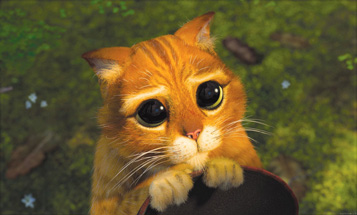Box Office - Decade at a Glance: May - August 2004
By Michael Lynderey
October 13, 2009
And finally, while all these comparatively smaller films were duking it out for supremacy, June 2004 ended just the way it had began: with a huge, uber-, mega-blockbuster. As the sequel to 2002's biggest film, Spider-Man 2 easily lorded over the early July season, opening on Wednesday, June 30th with a $40 million first day and $88 million over the weekend, with $373 million being the total when all was said and done. Granted, that was a bit lower than the first film's $403 million, but it wasn't for lack of trying - Spider-Man 2 received even better reviews than its predecessor, and the film still stands as one of the best comic book adaptations of all time. Headlining such a high-profile release increased the visibility of stars Tobey Maguire, Kirsten Dunst and James Franco. And, after Willem Dafoe as the Green Goblin in Spider-Man, part 2 continued the series' tradition of picking up excellent character actors, strapping them with villain gear, and turning them into foes for Spider-Man to fight off. This one had Frida's Alfred Molina, decked out in the arrogant, eight-armed visage of the nearly-unstoppable Doctor Octopus, a performance so well-reviewed it even received some Oscar buzz. The stage was set for the next film in the series to potentially be even bigger.
July
We had the weekend of July 2nd - 4th off to catch up on Spider-Man 2, but July 9th dished out some interesting titles competing for attention. The surprise winner of the pack was Will Ferrell's Anchorman: the Ron Burgundy Story, the first in Ferrell's collection of satirical takes on various occupations (most of them sports-related, but not this one). While the film's reception - enthusiastic reviews, audience delight, $28 million opening followed by $84 million total - seemed to be only a fairly simple matchpoint in Ferrell's continued ascension to the crown of Comedy King, there was more to the film than that. Anchorman was, in fact, the key first step in the domination of the Apatow Gang over American comedy in the latter half of the 2000s. If you look hard enough, just in the background to Will Ferrell, Christina Applegate, and all the one-armed anchorman jokes, you'll see:
1. The film marked the cinematic directing debut of frequent Apatow collaborator Adam McKay
2. It contained the first producing credit for Judd Apatow on a major film since 1996's The Cable Guy
3. Seth Rogen had a brief appearance, credited ominously as "eager cameraman"
More obviously, the film introduced Steve Carell as a potentially important comedic actor (this potential was confirmed the next year), gave frequent character actor David Koechner his first outwardly visible screen role, and finally, brought Paul Rudd back to the fore, as comedy star instead of romantic lead, his previous occupation.
All of this was not a coincidence. The Apatow Revolution was at hand.
Moving on, the week's also-ran was King Arthur, which teamed up with May's Troy to give the "two and a half hour historical epic" subgenre a one-two punch in the gut. This $90 million-budgeted entry in the summer blockbuster sweepstakes finished with only $51 million, despite an excellent performance by Clive Owen and the presence of summer '03 starlet Keira Knightley. Doing much better was Will Smith's latest, I, Robot, a frankly unremarkable sci-fier that performed like a perfunctory summer hit on July 16th, opening with $52 million and finishing with $144 million - another entry in that Smith-Sandler $100 million big-star chain that extended from 2002 to 2008. Somewhat more interesting, oddly, was the week's other release - following up her strong 2003 trifecta of Agent Cody Banks, The Lizzie McGuire Movie, and Cheaper by the Dozen, Hilary Duff delivered yet another solid tween hit with A Cinderella Story, her modern-day remake of you-know-what. Despite unfriendly reviews, this one opened with $13 million and finished at $51 million. During the summer of 2004, both Lindsay Lohan and Duff were on top of the teen queen game, but it wasn't to last - this was the last Duff vehicle that could reasonably be described as a hit. At the time, though, the Duff/Cinderella mash-up left a competitor, Alexa Vega's Sleepover ($9 million total), teeming with envy.
Continued:
1
2
3
4
5
6
|
|
|
|




